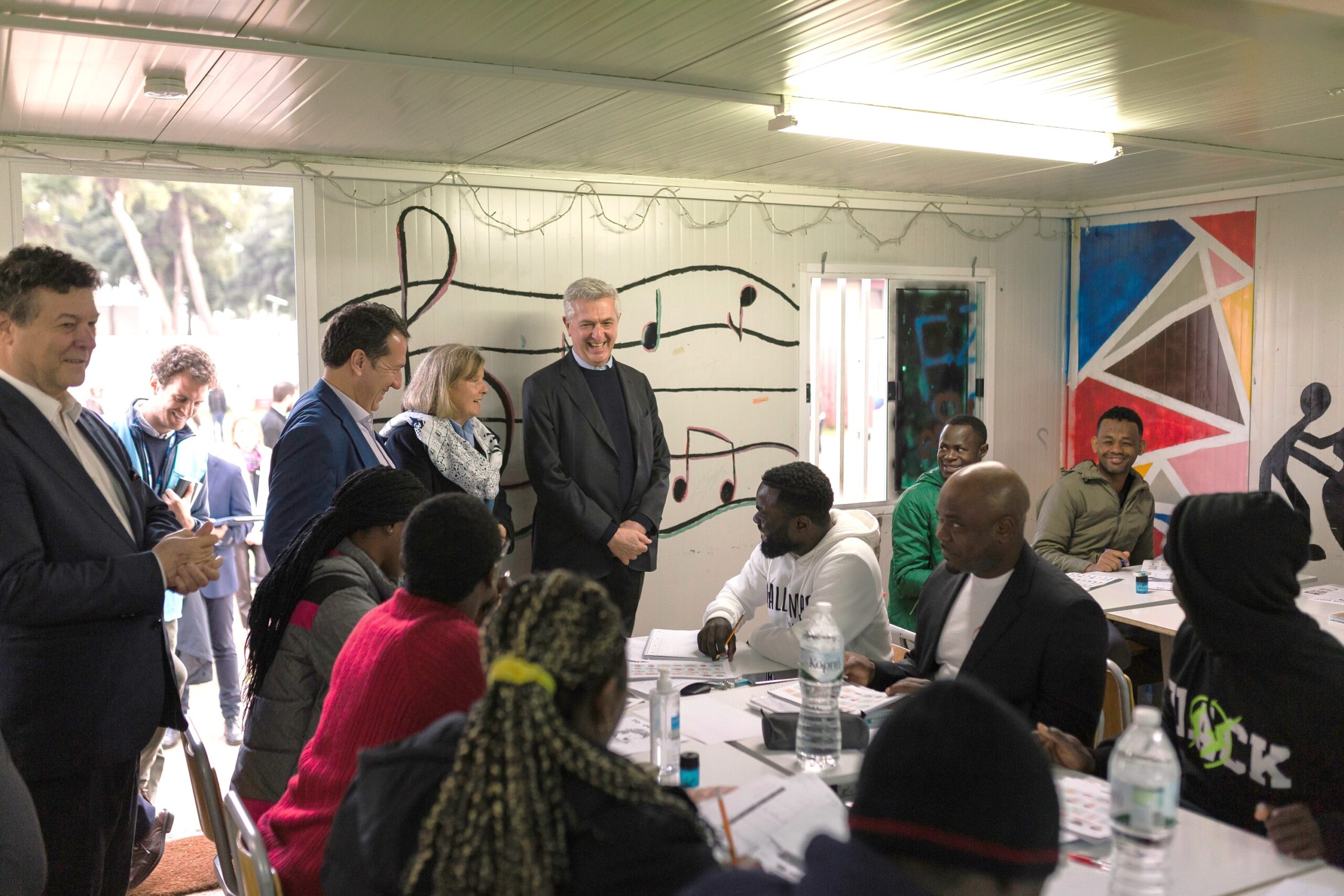
High Commissioner Filippo Grandi (M) is visiting a Greek language class for adult asylum-seekers in Ritsona Facility organized under the Stepping Stone integration programme of METAdrasi and UNHCR. From the left: UNHCR Regional Director for Europe, Philippe Leclerc, Secretary General for Reception of Asylum Seekers, Dimitris Iatridis, President of METAdrasi, Lora Pappa. © UNHCR/Achilleas Zavallis
Following a two-day visit to Athens, Greece, the UN High Commissioner for Refugees Filippo Grandi reaffirmed the commitment of UNHCR, the UN Refugee Agency, to continue working together with the Greek authorities, civil society organizations and refugee communities, in providing protection and solutions to people forced to flee.
During his visit, the High Commissioner signed a Host Country Agreement with the Minister of Foreign Affairs. “This marks a significant milestone, solidifying UNHCR’s long-standing partnership with Greece after 72 years of operations in the country”, Grandi said.
The High Commissioner also engaged in discussions with the Prime Minister, the Minister of Migration and Asylum and other central and municipal officials, focusing on ongoing developments and efforts to manage arrivals and advance refugee integration.
With Greece currently hosting some 75,000 refugees, the High Commissioner commended the progress achieved in promoting refugee integration, aligning with the country’s National Integration Strategy. This includes legislative improvements to foster integration, such as the reduction of the time asylum-seekers have to wait to have the right to work.
Since the establishment of a new civil Asylum Service in 2013, Greece has made significant strides at improving its asylum system, despite encountering challenges, particularly during periods of increased arrivals. While some challenges persist, primarily concerning access to asylum and registration of new asylum claims, Greece has managed to process a significant backlog of pending asylum applications and maintains a recognition rate consistent with the European average.
Urging the continuation of initiatives that support refugees to become self-reliant and actively contribute to their host communities, Grandi emphasized the importance of facilitating access to employment and affordable accommodation, addressing skills gaps, and streamlining administrative procedures to ensure timely provision of documentation.
The High Commissioner also visited Ritsona facility, the largest of the 26 state-run camps on the mainland, which currently accommodates some 2,100 asylum-seekers and refugees. Grandi noted the progress made in improving material conditions but also pointed to persisting challenges, particularly concerning the remote location which hampers accessibility of vital services, such as health care and psychological support, as well as access to employment opportunities and interaction with local communities – essential for integration.
The High Commissioner also met civil society organizations, acknowledging their invaluable contribution to the refugee response and reaffirming their indispensable role in providing essential services, which complement those of the government. “We need to recognize and safeguard the work these organizations do. A strong and active civil society is a fundamental part of democratic societies”, he noted.
On reports about pushbacks and human rights violations at Greece’s borders, Grandi noted the reduction of reported incidents on the islands, and emphasized the importance of transparent and conclusive investigations, so that any allegations involving human rights violations are thoroughly probed, with full accountability.
In addition, Grandi visited programmes run by UNHCR and its partners, aimed at facilitating refugees’ access to livelihood opportunities. “I was impressed by the excellent work done by our integration partners and humbled by the determination of refugees to rebuild their lives in Greece and contribute to the communities that have welcomed them”, he said.
In conversations with refugees who have secured employment in the country, Grandi observed their eagerness to become economically independent. He highlighted the mutually beneficial opportunity presented by refugees’ integration into the Greek workforce, stressing its positive impact for refugees, host communities, the economy, and society at large.
Share on Facebook Share on Twitter